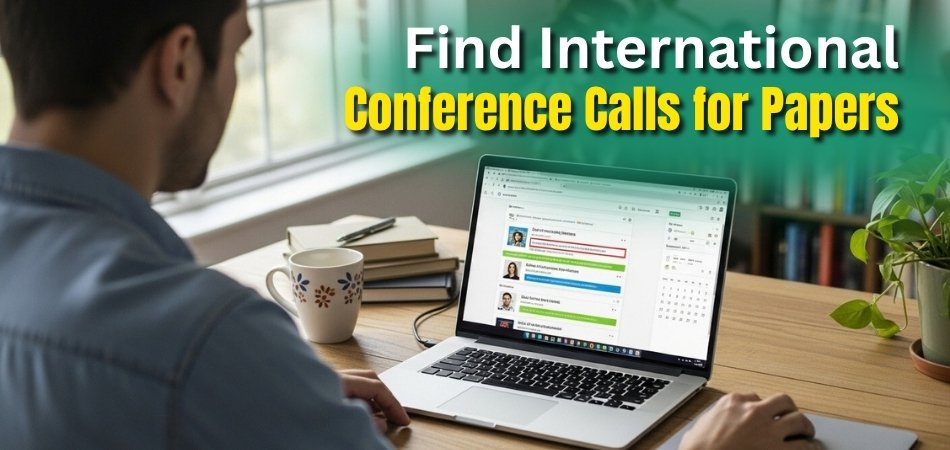Finding the right academic platform to share your research can be challenging, especially when opportunities are spread across global events and disciplines. Many researchers wonder how to reach wider audiences, build recognition, and connect with peers who share similar interests. That’s where conference calls for papers come in.
If you’re asking yourself how do I find international conference calls for papers, the answer starts with knowing where to look and how to stay updated. From academic networks to CFP websites and mailing lists, several trusted sources regularly publish calls inviting submissions from around the world.
Exploring these channels not only helps you find relevant events but also improves your chances of presenting your work on an international stage. Keep reading to discover practical ways to locate and respond to CFPs effectively.
How Do I Find International Conference Calls for Papers?
Finding international conference Calls for Papers (CFPs) is the first step toward sharing your research on a global stage. These opportunities allow scholars, professionals, and students to present their findings to an international audience and build valuable academic connections. Below are the most effective ways to find them and stay informed about new opportunities.
CFP Listing Sites
Dedicated CFP websites like AllConferenceAlert, ConferenceIndex, 10Times, and Global Conference Alliance publish thousands of upcoming international conferences. These sites allow you to filter by field, location, or date, making it easier to find relevant opportunities. Subscribing to updates ensures you never miss deadlines for suitable conferences.
University and Research Institution Websites
Many universities and research centers host conferences throughout the year. Visiting their official websites or event pages can help you discover exclusive CFPs not listed elsewhere. Institutions often invite submissions from researchers worldwide, providing valuable exposure and collaboration opportunities in your area of study.
Academic Databases and Networks
Platforms such as ResearchGate, Academia.edu, and Google Scholar offer more than just research papers. They also feature CFP notifications shared by organizers or peers. Following specific topics or researchers helps you receive alerts for upcoming conferences and academic events that align with your field.
Mailing Lists and Google Alerts
Joining academic mailing lists or setting up Google Alerts with keywords like “Call for Papers 2025” or “Technology Conference CFP” keeps you updated automatically. These tools deliver relevant announcements straight to your inbox, ensuring you stay informed without spending hours searching different websites.
Professional Associations
Professional organizations often maintain dedicated CFP sections on their websites. Associations such as IEEE, Springer, or Elsevier regularly announce global research events and invite members to submit papers. If you plan to present your work at a conference in Canada, the USA, or other international venues, being part of such associations ensures you get early access to submission calls and networking opportunities.
Finding international CFPs becomes easier once you consistently follow these methods. Combining platform searches, academic networks, and timely alerts helps you stay organized, meet submission deadlines, and strengthen your presence in the global research community.
Why International Conference Calls for Papers Matter?
Participating in international conference Calls for Papers is more than just submitting research; it’s a gateway to academic recognition and professional growth. These opportunities allow scholars to share innovative ideas, gain constructive feedback, and build credibility in their respective fields. The following points highlight why they hold such significance for researchers and professionals worldwide.
Exposure and Visibility
Submitting your paper to international conferences enhances visibility among peers and experts across disciplines. Presenting your work before a diverse audience increases your research impact and reputation. It also positions you as a contributor to global academic discussions, which can lead to invitations for collaborations and future research projects.
Academic Credibility
Accepted papers in recognized international events add weight to your academic profile. They demonstrate the quality and originality of your work while showcasing your ability to meet global standards. This credibility becomes valuable for career advancement, grant applications, and research partnerships that require proven scholarly competence.
Global Networking Opportunities
Attending international conferences allows you to meet researchers, professionals, and industry leaders from different regions. These interactions often lead to collaborations, co-authored papers, and institutional partnerships. Networking through CFP participation helps establish a global identity, enriching your understanding of new methodologies and perspectives in your research area.
Pathway to Publication
Many international conferences are linked to peer-reviewed journals or special issues. When your paper is accepted, it may qualify for publication in indexed journals, increasing your research visibility even further. Such opportunities help extend your academic influence while ensuring your work reaches a wider scholarly audience.
Broader Academic Impact
Unlike local events, international CFPs reach audiences across continents, helping your ideas contribute to global progress. These platforms promote cultural exchange and cross-disciplinary learning. Understanding their structure also helps if you plan to write a call for papers for a conference, offering insight into attracting meaningful and high-quality submissions effectively.
Participating in international CFPs enriches your professional journey in every dimension. From visibility and credibility to collaboration and publication, these experiences shape your growth as a researcher ready to make an impact beyond borders.
How to Use Social Media and Mailing Lists for CFP Alerts?
Social media and mailing lists are powerful tools for staying informed about upcoming Calls for Papers. They connect researchers with real-time updates, event organizers, and academic communities worldwide. To maximize your reach, it’s essential to use social channels and mailing lists consistently. The following points explain effective ways to track international CFP alerts using these digital tools.
Follow Relevant Hashtags
Search and follow hashtags like #CallForPapers, #AcademicConference, or #CFP2025 on LinkedIn, Twitter/X, and Instagram. These tags help you find new CFP announcements shared by conference organizers and universities. Engaging with these posts also improves visibility among peers and academic networks with shared research interests.
Join Academic Communities
Academic and professional groups often post verified CFPs and discussion threads about upcoming conferences. Joining these communities gives you access to insights, peer recommendations, and early submission announcements. Regular participation also helps build relationships that may lead to research collaborations or speaker invitations.
Subscribe to Professional Mailing Lists
Organizations such as IEEE, Springer, and Elsevier run mailing lists that notify subscribers about conferences within specific disciplines. Subscribing ensures you receive CFP alerts directly from trusted sources. It also keeps you informed about publication opportunities and journal partnerships connected to those events.
Use Twitter/X for CFP Updates
Twitter/X remains a fast and reliable source for CFP notifications. Many organizers and institutions post announcements or reminders about approaching deadlines. Following official conference accounts and enabling notifications allows you to act quickly when new opportunities arise, ensuring you don’t miss relevant calls in your field.
Create Personalized Alerts
Set up automated Google Alerts using specific keywords like “Call for Papers 2025 + Artificial Intelligence Conference” or “Humanities Conference 2025 CFP.” These alerts deliver new listings to your email as soon as they appear online. Customizing keywords for your field helps filter out unrelated results and saves valuable research time.
Staying connected through social media and mailing lists keeps you informed and competitive in the global research community. Consistent use of these tools ensures you catch valuable CFP opportunities early and position your work for greater academic recognition.
Reading CFP Guidelines: What to Look For Before Submitting?
Reading Call for Papers (CFP) guidelines carefully is essential before submitting your research. Every conference sets specific requirements for paper format, length, and scope. A thorough review of the CFP ensures professionalism and accuracy. Below are the key aspects to check before you finalize your submission.
Required Formats and Word Limits
Most CFPs specify whether they require an abstract, a full paper, or both. Pay attention to formatting styles, word limits, and reference guidelines. You can also look at a conference call for paper template to understand the standard structure and required elements before preparing your submission.
Submission Deadlines and Contact Information
Check the official submission deadlines and note them in your calendar to avoid last-minute errors. CFPs usually include contact details for queries or technical support. Keeping this information handy ensures quick communication if issues arise during the submission process.
Conference Topics and Scope Alignment
Before submitting, confirm that your paper matches the conference theme or listed subtopics. Review the CFP’s scope to ensure your research contributes meaningfully to the discussion areas. Submissions outside the stated focus are often declined, regardless of quality or originality.
Review Process Details
Many conferences mention whether submissions will undergo peer review, double-blind review, or editorial screening. Understanding this process helps you tailor your paper accordingly. In double-blind reviews, for example, you should remove identifying details like names or institutional affiliations.
CFP Submission Checklist
| Checklist Item | Yes/No |
| Topic matches conference theme | ☐ |
| Abstract meets word limit | ☐ |
| Deadline noted in the calendar | ☐ |
| Contact email verified | ☐ |
Reviewing CFP instructions carefully builds confidence in your submission. A well-prepared and guideline-compliant paper increases your chances of acceptance and reflects professionalism that stands out in competitive international conferences.
Common Mistakes to Avoid When Responding to a CFP
Many researchers lose valuable opportunities by making avoidable errors during the call for papers process. Understanding these common mistakes helps you submit your work confidently and meet all academic standards. By identifying where others go wrong and knowing how to fix those issues, you can greatly improve your acceptance chances.
Ignoring Format or Deadline Instructions
One of the most frequent errors is overlooking formatting and submission deadlines. Conferences reject papers that do not meet layout, word count, or reference guidelines. Always follow every instruction mentioned in the CFP and submit before the deadline to avoid automatic disqualification.
Submitting to Unknown or Predatory Conferences
Many low-quality or fake conferences solicit submissions for profit. Submitting to them can harm your credibility. Always verify the conference’s authenticity by checking its past events, official website, and organizing institutions. Reputable platforms like IEEE or Global Conference Alliance are safer to trust.
Using Generic Abstracts That Don’t Match the Theme
Submitting a broad or unrelated abstract reduces your chances of acceptance. Tailor your paper to fit the conference theme and highlight how your work contributes to the discussion. Carefully read the CFP’s focus areas and ensure your abstract reflects originality and clear alignment with them.
Forgetting Plagiarism and Citation Checks
Failing to verify originality can lead to immediate rejection. Use plagiarism detection tools and ensure all sources are correctly cited in the required format. Following ethical research practices demonstrates professionalism and helps maintain the academic integrity of your submission.
Sending Unedited or Incomplete Drafts
Submitting papers without proper proofreading weakens your presentation. Spelling or grammatical mistakes suggest carelessness. Always review your paper multiple times or seek peer feedback before submission. A clean, polished draft shows attention to detail and leaves a strong impression on reviewers.
Before submitting your paper, take time to review it against all CFP requirements. Double-check formatting, originality, and alignment with the theme. Small corrections made early can prevent rejection later and help your work stand out in competitive international conferences.
How Early Should You Submit Your Paper?
Submitting your paper early gives you a clear advantage in the Call for Papers process. Early planning reduces stress, improves quality, and increases your chances of acceptance. It also provides time to revise your work, address reviewer comments, and ensure every detail meets the conference’s submission requirements. The following points explain why early submission is essential and how to manage deadlines efficiently.
More Time for Revisions and Feedback
Submitting ahead of schedule allows you to refine your research based on peer or mentor feedback. Early submissions provide room for improvement if reviewers suggest minor edits. This extra time helps you produce a stronger, more polished paper that aligns closely with the conference theme.
Reduced Technical or Submission Errors
Last-minute submissions often lead to technical issues or formatting mistakes. By preparing early, you can test file uploads, review guidelines, and confirm contact details without rushing. Early submission ensures smooth processing and minimizes the risk of missing crucial requirements or deadlines.
Better Communication with Reviewers
Submitting early gives organizers time to review your paper thoroughly, which can lead to quicker feedback or clarification requests. Early communication helps you address reviewer concerns effectively and shows your professionalism in meeting conference expectations.
Maintaining a Personal CFP Tracker
Keeping track of deadlines helps you plan submissions efficiently. Use a simple Google Sheet or Trello board to list conference names, submission dates, and review statuses. A personal tracker prevents confusion and ensures you never overlook an important date or event in your research schedule.
Building a Habit of Consistent Preparation
Early submission is not just about meeting deadlines—it reflects consistency and responsibility. Developing this habit builds your academic discipline and confidence over time. Each on-time submission strengthens your reputation as a committed researcher who values both quality and punctuality.
Submitting your paper early ensures smoother processing and better outcomes. Start searching for international CFPs today, prepare your research in advance, and stay ahead of deadlines to secure your place among global academic contributors.
Frequently Asked Questions
Finding and responding to international Calls for Papers can be exciting but also confusing for newcomers. Below are some of the most common questions researchers ask after exploring how CFPs work, along with simple, helpful answers to guide you further.
What is the Difference Between a Conference Paper and a Journal Paper?
A conference paper is usually shorter and presented at an event, while a journal paper is longer and published after peer review. Conference papers often lead to deeper journal studies later, allowing you to expand your research findings further.
How Do I Know if a Conference is Legitimate?
Check the conference’s website, organizer details, and previous editions. Look for partnerships with known institutions or publishers like IEEE or Springer. Reading attendee reviews or verifying ISSN numbers also helps confirm the event’s authenticity and credibility.
Can Students Submit Papers to International Conferences?
Yes, many international conferences encourage student participation. Some even have dedicated student tracks or discounted registration fees. Submitting early helps students gain exposure, experience academic discussions, and connect with professionals in their chosen research fields.
What Happens After a Paper Is Accepted?
Once your paper is accepted, you’ll receive a confirmation email with presentation details. You may need to register, prepare slides, or join rehearsal sessions. Presenting your work gives you valuable experience and increases your visibility in your research area.
Do I Need to Pay Any Fees for Submission or Participation?
Some conferences charge submission or registration fees, while others are free. Always review the CFP or event website carefully to understand costs before submitting. Many institutions or sponsors offer partial support for researchers presenting accepted papers.
How Can I Improve My Chances of Acceptance?
Focus on originality, clear writing, and topic alignment with the conference theme. Review your work multiple times and follow all CFP instructions closely. Getting feedback from mentors or peers before submission also increases acceptance chances.
Are Virtual Conferences Equally Valuable for Researchers?
Yes, virtual conferences offer flexibility and broader access to global audiences. They provide similar networking and presentation opportunities without travel costs. Many researchers find them a convenient way to share work internationally and engage with experts from diverse backgrounds.
Concluding Lines
Participating in international conferences is one of the best ways to share your research and connect with a wider audience. Once you understand where and how to find the right opportunities, submitting to Calls for Papers becomes a smooth and rewarding process. Preparation truly shapes success in this journey.
For those still asking how do I find international conference calls for papers, the answer lies in being consistent and organized. Explore CFP directories, follow academic communities, and set alerts to never miss a relevant submission window. Staying informed gives you a strong edge in competitive research fields.
Each successful submission expands your academic presence and network. Keep improving your research, meet new collaborators, and explore diverse conferences worldwide. Begin your search today and let your ideas reach audiences across international academic platforms.








